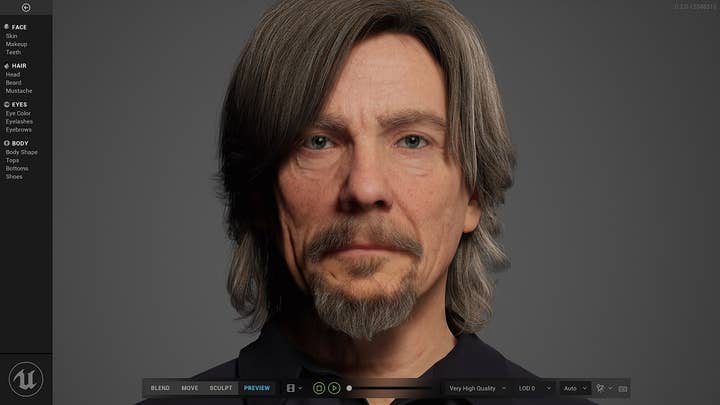Epic's new tool promises high-fidelity human characters in under an hour
Tech exec Vladimir Mastilovic says MetaHuman Creator that produces final-quality rigs, meshes, and textures is less a tool than "a game that even children can play"
"If you're making a game and you require photorealistic humans, it's one of the most expensive things you have to deal with," Epic Games chief technology officer Kim Libreri tells GamesIndustry.biz in a recent pre-briefing.
"And the ceiling is pretty tough glass and pretty hard for many people to get across, unless you deploy the expertise of someone like [Epic subsidiary] 3Lateral."
Epic is looking to soften that ceiling with today's announcement of MetaHuman Creator (MHC), a new cloud-based tool that runs in a browser and was developed by 3Lateral to make high-quality 3D characters an achievable goal for any developer.
3Lateral founder and Epic VP of digital humans technology Vladimir Mastilovic says MHC can create "super high-end PlayStation 5 equivalent of assets we would do for the latest games" in a fraction of the time.
"I wouldn't even call it a tool," Mastilovic says. "It's a game that even children can play."
Libreri adds, "Imagine it as a sort of RPG character creator without the extreme constraints that you get with them, and all the data sourced from actual, real, plausible human faces that mean you're always going to end up staying on model and making something believable."
Once users are happy with their created characters, they can export their assets in various levels of detail, rigged and ready for animation and motion capture in Unreal Engine, and get Maya files with source data including meshes, skeletons, facial rigs, animation controls, and materials.
MHC is launching through an Early Access program within the next few months. Epic has already launched a preview with two finished characters, an assortment of sample clothing and 18 differently proportioned body types.
Naturally, there are limitations. While Libreri says "expert" Unreal Engine users will be able to adjust the tool's output once they bring it into the engine, MHC right now is only really intended to produce high-fidelity character models in a specific visual style common among AAA graphics showpieces.
"Eventually we'll open up the product to support both stylized filters within the tool that allow you to go toward a more cartoony look, and also eventually we'll allow you to upload your own default sculpt of a stylized character and have the system auto-rig that character," Libreri says.
"But we wanted to make sure the foundation for the very hardest problem is solved first so we don't end up in a place where we're having to backtrack because we missed some assumptions about what it takes to get closer to crossing the uncanny valley."

Mastilovic adds, "We're not claiming to cross the uncanny valley here. We're more targeting The Last of Us/Uncharted kind of look, where it's obviously a digital character but it's a pleasant-looking digital character."
Libreri says the goal isn't photorealism -- at least not with version 1.0 of MHC.
"They look pretty good when they animate," Libreri says. "You wouldn't make a movie with a close-up of the MetaHumans yet. Five years down the line, who knows? Let's see where they go."
Epic is looking at MHC as a live service, and expects to add new characters and capabilities to it every few months.
"Right now the tool cannot make kids, teenagers, or extremely old people," Mastilovic says, "so expanding on that variety is going to be one of our next steps."
Update, Feb. 11: This article originally stated the MHC would launch with two sample characters. Epic has clarified that the two sample characters are already available for developers to preview, and the Early Access version will have more.


